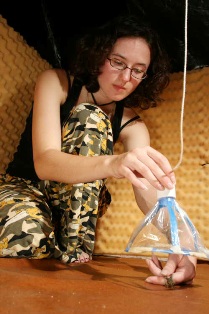SU Faculty, Students Advance Frog Research in Panama
 |
| SU student Jessica Morris prepares a frog for testing. |
For the past five years, Taylor has studied the evolution of mate choice and multimodal communication in the tungara frog, found in Panama, on a grant from the National Science Foundation. Since 2007, he has involved SU students in his research, working with them at the Smithsonian Tropical Research Institute.
“Multimodal communication is the process by which animals generate a communication signal using multiple sensory modalities,” said Taylor. “The easiest way to think about it is the process by which humans use both words and hand gestures to communicate.”
Female frogs us a multimodal signal to assess potential mates—a difficult task as they must discriminate between the calls of many males. Taylor’s research seeks to refine the understanding of the process and how those female preferences may affect male evolution.
“For example, in most birds, males are more colorful than females,” he said. “This occurs because females prefer to mate with males that are brightly colored. Brightly colored male birds tend to leave more brightly colored progeny in the next generation than dull-colored males. Over evolutionary time, brightly colored males become more common in the population.”
Taylor and his students used a combination of audio recordings of male mating calls and a robotic frog to mimic visual cues. This allowed the researchers to test the female frogs’ preferences in the attractiveness of potential mates.
“The students and I would go out each night into the field to collect frogs,” Taylor said, recalling his past two summer research experiments. “We brought them back to the lab to conduct behavioral experiences, then released them at the end of the night after testing. Most study nights entailed working until about 3 or 4 a.m.”
Taylor plans to continue involving SU students in his research in the future, calling it a win-win for them.
“The students not only gain experience in research, but also gain exposure abroad and learn what is involved in spending a summer working in Latin America,” he said.
For more information call 410-543-6030 or visit the SU Web site at www.salisbury.edu.
